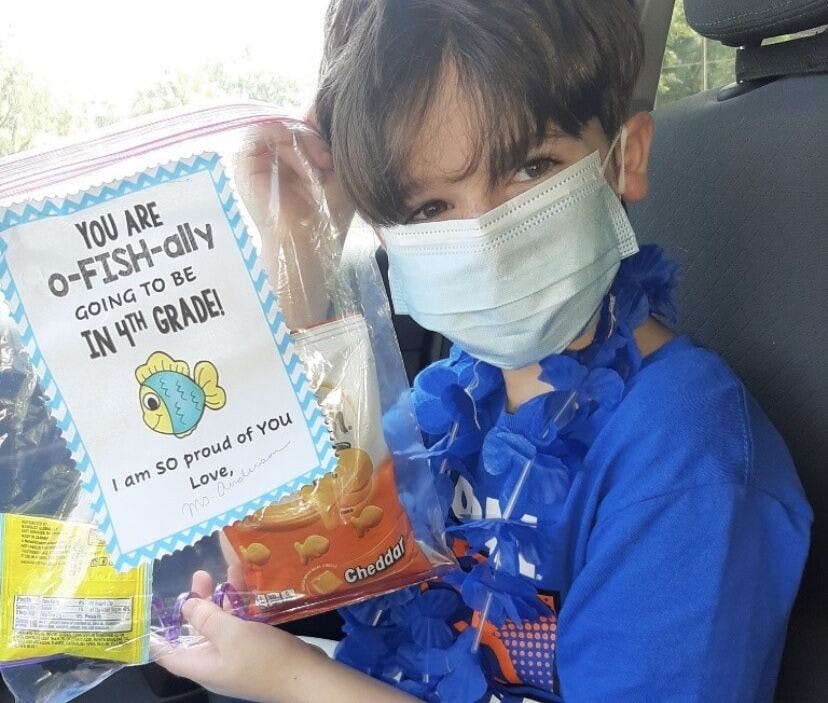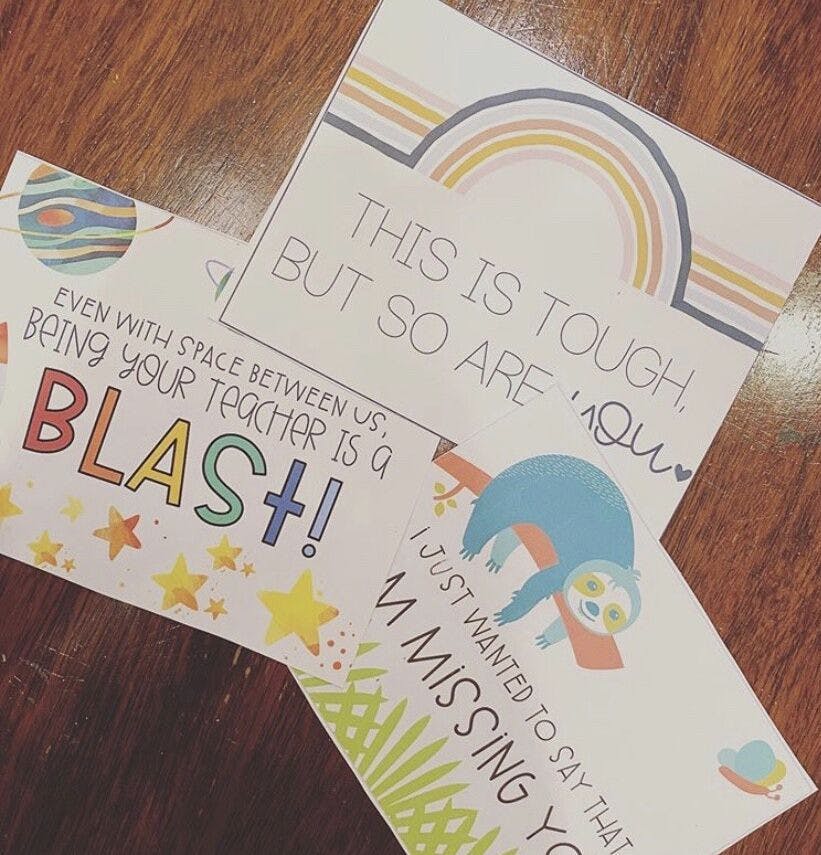
Rising Stephen Foster Elementary School fourth grader Cassius Goldman holds a congratulatory piece of “miss you mail” from his third grade teacher, Stephanie Anderson.
Kaayana Sharma, 10, spent recess playing Ga-Ga Ball with her friends — a popular pastime of students at Stephen Foster Elementary School. The ball would fly among students while they jumped and laughed during a break from their classes.
Then, the COVID-19 pandemic erupted, and Kaayana’s fourth grade experience was cut short. Now, she may return to school for the first time since March, but she has to wear a face mask.
The Alachua County School Board will require the use of face masks when Alachua County Public Schools start Aug. 24. While classes are set to start two weeks later than initially scheduled, many students and teachers believe the plan didn’t consider their safety.
Students and families can choose to return to brick-and-mortar schools or learn digitally.
While Kaayana said she will miss recess, she and her family decided that online classes were the safest option.
Kaayana’s third grade teacher at Stephen Foster Elementary School, Stephanie Anderson, doesn’t have the option to teach remotely.
While some students are opting to learn in-person, district teachers must return to work. According to a state mandate issued July 6, Florida schools must reopen.
While Anderson predicts many of her students will choose the digital academy, the school district is requiring she be in the classroom — risking her life, she said. With slow testing and a rise in cases, Anderson said she believes there isn’t a safe way to return to the classroom.
“There's nothing I want more than to be in the classroom with the students,” she said. “But I don't think it's safe for the community to go back right now because there will be an outbreak.”
Anderson said she supported the school start delay at last week’s school board meeting. During her three-minute comment to the board, she said when her class sink broke last year, it took three months to be fixed. Without increased funding for janitorial staff and school resources, schools will struggle enforcing proper hygiene for students, she added. Anderson said her frustration isn’t with the Stephen Foster administration, but with the county and state.
“I do not think that we are prepared in any way to go back, as far as PPE or supplies needed,” she said. “Every year, students are the ones that are required to donate Lysol wipes, hand sanitizer or paper towels.”
Anderson said her family is terrified for her return to the classroom. Her parents are both elderly and immunocompromised, and the family has strictly quarantined together.
When she pictures the return to school, she said she imagines students hugging in the hallways, removing their masks and touching their faces.
Online classes will also be challenging, she said. Third grade students aren’t proficient in typing and are confined by their parents’ work schedules.
“That was extremely challenging, but at the same time, if it protected one student, everything was worth it,” she said.“If it protected one parent, everything was worth it.”
ACPS teachers will be trained for digital academy classes from Aug. 10-13, Anderson said. The program aims to ensure that students remain under the school’s usual schedule from the safety of their homes.
For students learning virtually, Anderson said she is planning morning meetings where students can discuss their day and ask goofy questions. While they may be behind laptop screens, she wants to bond with new students and encourage them to join in conversations.
In the spring, Anderson sent “miss you mail” to each of her students to put a smile on their mask-covered faces.
“It will be a community, and it's not ideal, but to keep people safe, it is what it is,” she said. “Kids are resilient, and kids are adaptable.”

Stephanie Anderson, a third grade teacher in Stephen Foster Elementary School’s magnet program, sent “miss you mail” to all of her students after classes were transitioned to an online format.
Shelley MacLean, a math teacher at Eastside High School, shares Anderson’s concern.
Her family is also worried about her return to the classroom, MacLean said. Like Anderson’s parents, her sister’s partner is immunocompromised. Her sister is also set to welcome a new life to the family Friday.
MacLean said she also called into the school board meeting. She told the school board that members of Eastside’s student government provided a forum for students to express their concerns about returning to school.
Many students mentioned the lack of resources, such as toilet paper, paper towels and napkins, MacLean said.
Saanvi Lalwani, 15, is a rising junior and senator in Eastside’s student government. She told The Alligator about her peers’ concerns.
“It's really unlikely that they're going to clean the bathrooms after every use,” she said. “The bathrooms could have germs, and then it's spread to the next person who uses it.”
While she said she misses participating in the band, competing on the math team and socializing with her friends, Saanvi said she doesn’t want to risk the safety of her and her family.
To Saanvi, a computer screen between her and MacLean’s precalculus class is preferable to putting her family in danger. However, she said she’s fearful for her friends that are returning to in-person classes.
“Many people I know are just going back because they miss social interaction, so if they're going back just for social interaction, then they're probably going to be in contact with other people,” she said. “It is kind of scary because there have been cases of teens dying. It’s better to be safe than sorry.”
Saanvi said she doubts that students will wear masks in the bathrooms or when they are away from the supervision of teachers. The school board also didn’t outline social distancing procedures within the classroom, which creates more worries for students.
The students who return to school will come from two groups: those who don’t have access to the internet or computers and those whose parents don’t believe in the severity of COVID-19, MacLean said.
“It's really difficult because I know that online learning is not going to be what is needed, but you can't learn if you are busy grieving for a family member or grieving for a teacher who has passed away — or if you yourself are so critically ill that you can't do anything,” she said.
She also added that there are teachers who have chosen to retire early because of the pandemic. These teachers were forced to make a choice between financial loss and the risk of dying.
Like Anderson, MacLean doesn’t blame the administration but the county, state and national governments.
The U.S. is treating the reopening of schools like reopening stores, MacLean said. To MacLean, a school full of children who sit in a 20-foot by 20-foot room for seven hours a day can’t be compared to an aisle in Walmart.
Custodians in her school also struggle restocking toilet paper and paper towels, she added.
“To say that the job's not being done is not to criticize the people doing the job,” she said.”It's to criticize the system that's not giving them the resources.”
As a child, MacLean missed two months of school due to an injury, she said, adding that it didn’t hinder her because she still graduated at the top of her class and became a teacher.
“Put education on hold for a minute and just keep people safe enough that we can bring them back,” she said. “Things will be delayed, it'll be unfortunate, but I'd rather that than go to school every single day worried about whether I'm bringing something home to someone I love.”





